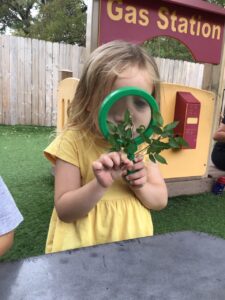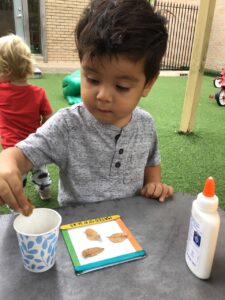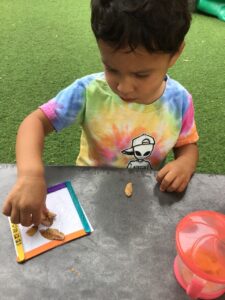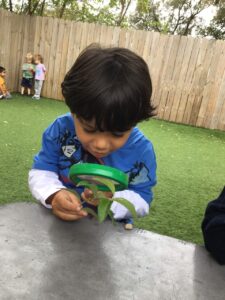Outdoor Classrooms
As parents of young children attending Stepping Stone School, you’re likely aware of the importance of outdoor play in your child’s early education. But do you know just how impactful it can be? Let’s explore the numerous advantages that outdoor play brings to your child’s learning and development.
- It Invites Children to Learn Science – Nature is a perfect classroom for young explorers. You don’t need formal science lessons; outdoor play naturally encourages your child’s curiosity. Children are born discoverers, and their questions can become group inquiry projects. Outdoor play naturally sparks scientific wonder, add engaging picture books into the mix, and you’re also boosting early literacy skills.
- It Creates Opportunities for Social Interaction and Collaboration – Outdoor play is an ideal setting for children to interact and build valuable social skills. It’s not just about having fun; it’s about practicing empathy, problem-solving, taking turns, offering encouragement, and understanding the rules. It’s where lifelong friendships and the foundation for future teacher relationships begin.
- It Promotes Physical Health – Physical activity is vital for children’s health. Outdoor play offers an opportunity to model the joy of physical activity, helping children build gross motor skills and healthy habits.
- It Invites New Contexts for Learning – Outdoor spaces provide unique opportunities for learning that are difficult to replicate indoors. Imagine reading about nature under the shade of a tree, splashing water at an outdoor water table or collecting leaves. These experiences not only encourage movement but also align with educational goals, making learning fun and engaging.
- It Promotes Better Sleep – Research shows that children who play outdoors tend to sleep better at night. The combination of physical activity, reduced stress, and exposure to natural light contributes to a more restful night’s sleep. Share this valuable information with families – a well-rested child is a happy one.
- It Gives Children a Chance to Take Appropriate Risks – Outdoor play encourages children to challenge themselves, helping them learn new skills, such as climbing higher, running faster, or jumping farther. All of this happens under the watchful eye of a caring adult, fostering a sense of safety and confidence.
- It May Lead to Better Learning Outcomes – Research has shown that recess, whether indoors or outdoors, benefits older children in the classroom. It’s reasonable to assume that younger children also benefit from brain breaks in the form of outdoor play, enhancing their attention and productivity.
- It Supports STREAM Skills – The great outdoors is a fantastic place for hands-on STREAM (science, technology, relationships, engineering, arts and mathematics) activities. Building, experimenting with sand and water, and exploring the natural world all help your child develop these essential skills. Almost any indoor activity can be adapted for outdoor exploration.
- It Anchors Children to the Real World – While discussing pictures in books is educational, observing the real world is even better. Encouraging your child to engage with the natural world – watching birds, observing insects, or identifying plants – fosters a deeper understanding of their environment.








In Scandinavian countries, the term for living close to nature is Friluftsliv. Living close to nature can encompass anything from hiking, to berry picking and fishing, or be as simple as going for a nature walk or bike ride near your home. Frilusftsliv is simply a chance to get outside and enjoy nature – winter or summer, day or night, rain or shine, mud, sleet, or snow. Scandinavian children enjoy more unstructured outdoor playtime – the average preschooler in Stockholm spends six hours outside each day in good weather and an impressive 90 minutes in winter.
One of the best things about nature, is it is ALWAYS OPEN! Getting outside is one of the best ways for your family to boost its resilience. Spending too much time indoors reduces your Vitamin D level. John de Pluma, MD, a board-certified internist and proponent of nature therapy points to research suggesting an association between visiting forests and improving immune responses. Scientific evidence does associate Vitamin N (N for nature) with reduced stress, better mental and physical health and greater cognitive functioning. Connecting with animals (wild and domestic) may also offset the downside of social distancing.
The following are some ways to bring your family back to nature:
- Pick a Sit Spot, Children and adults should find a special place in nature, whether it is under a tree at the end of the yard, a hidden bend of a creek, or a rooftop garden. Get to know it by day and night. In cool and warm weather, during rain or snow. Doing so can reduce your sense of isolation. Building a fort, den or tree house can help children with problem solving, creativity, planning and a sense of security and place.
- Set up a World Watching Window, If your family is lucky enough to live where stars are visible, stargaze in the evening or very early morning. Locate a few key constellations with your children and orient to those. Other world watching window activities can include cloud spotting, bird-watching, taking nature photos and recording the sounds of birds and other creatures.
- Take a hike or do other exercises outdoors, You can take walks in your neighborhood, parks or forests. Games can help you keep your child’s attention. A game called “Walk this way” involves imitating different animals along the way. Bring toys or props that will make it more fun, like hats, binoculars and walking sticks. Walkie-Talkies are also a big hit. Encourage children to take turns as the “hike leader,” walking in front and setting the pace. You can also play “find ten critters” on longer hikes. This includes discovering footprints or other signs of an animal passing through.
- Got dirt? Set aside a piece of ground in the backyard for children to dig in. Research suggests that children strengthen their immune systems by playing in dirt – and weaken those systems by avoiding dirt.
Although the many benefits of being in nature have been researched, children are spending less time outdoors than ever. Being outside in unstructured environments has numerous cognitive benefits. It is common for children to have trouble focusing in the modern world with all the stimuli from media, and technology, as well as having to sit still for long periods of time.
Outdoor play is a cornerstone of your child’s early education at Stepping Stone School. It’s not just a break in the daily schedule; it’s an opportunity to learn, develop, and have fun. With benefits ranging from physical health to social and cognitive growth, outdoor play is an integral part of your child’s daily routine to unlock a world of learning and joy!